Natural Remedies to Lower Anxiety
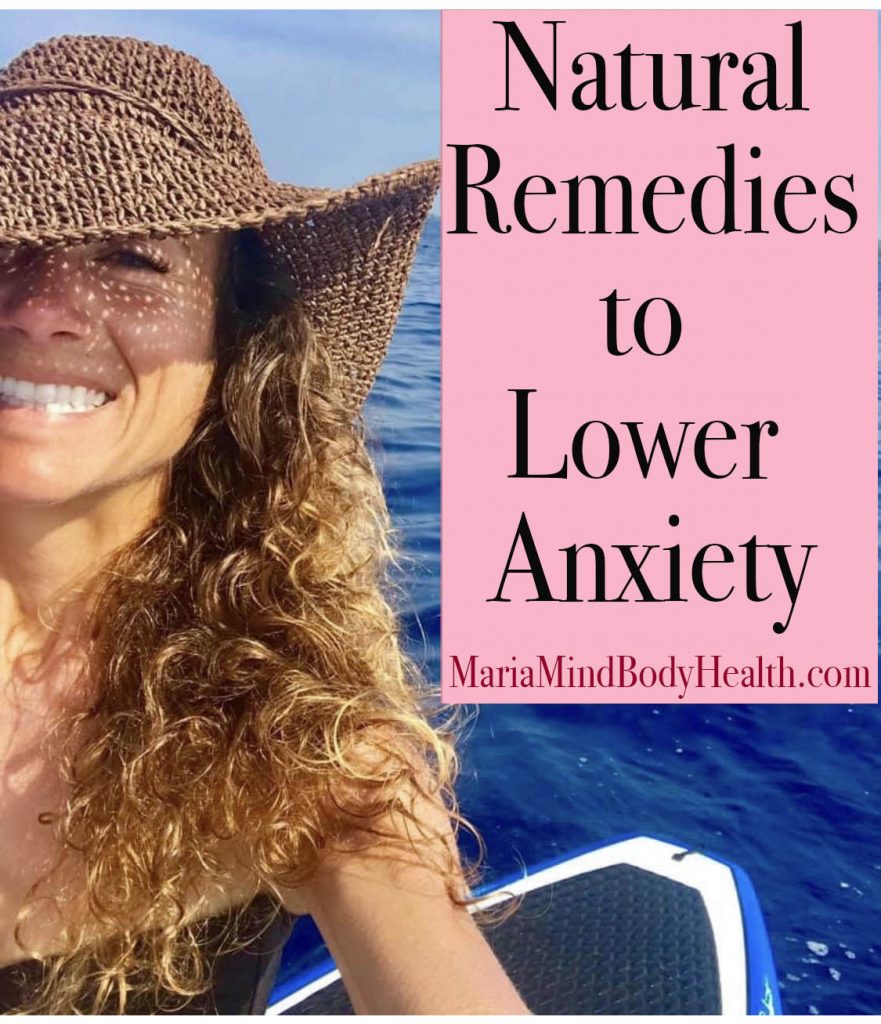
When I was younger I suffered from anxiety and depression. I wish I would have known what I know now on how food effects our moods.
At one of my book signings, a teenage girl and her mother came up to me crying and said if it weren’t for my help, she would be institutionalized. The young beautiful girl suffered terribly with anxiety but food and supplements changed her life! I always love hearing testimonies from people when I meet them, but hearing testimonies about anxiety and depression lifting, makes my heart so happy!
Anxiety affects approximately 19 million adults in the US. With the situation of Covid-19, I’m sure this number is much much higher now.
Along with Covid-19, we had a terrible death happen in Craig’s family this week and then last night there was an earthquake off shore and we were alerted to be ready to take cover for a tsunami! Luckily, it was downgraded from a tsunami to a large wave! But after all of this, my anxiety was getting the best of me!
In my book Secrets to Controlling Your Weight, Cravings and Mood, I write about GABA and it’s connection to anxiety. Fifty percent of people have GABA-dominant natures. GABA-natured people are sociable and remain calm amongst chaos. They love organization and are dependable. People with GABA-dominant natures don’t have wild mood swings and love team or group activities. GABA is the brain’s natural calming agent.
People with low levels of GABA are in a constant state of anxiety that increases the desire for food and can trigger binging. Plus, this condition can cause stress-related physical symptoms and muscle aches. Studies also show that GABA shortfalls elevate levels of the stress hormone cortisol, which can contribute to the storage of fat in the belly, sleep issues and will eventually burn out the adrenals. This decreases our ability to deal with everyday stressors, and the cycle continues.
There are many ways to help GABA levels and lower anxiety. Here are the top things to consider when trying to naturally lower anxiety.
THINGS TO ELIMINATE TO LOWER ANXIETY
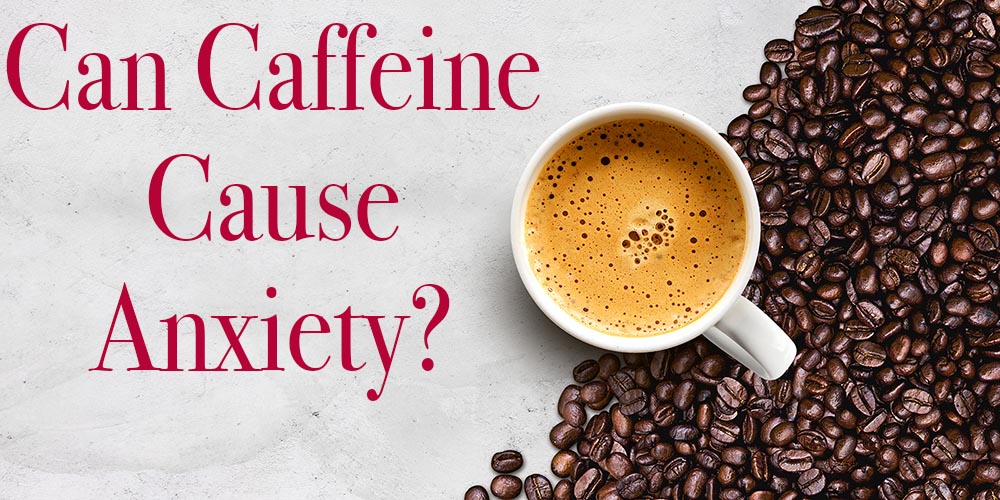
1. Stop Caffeine
I worked at a coffee shop since I was 15! I understand the love for coffee, but when I finally kicked the habit 7 years ago, I never felt better! It helped me lower my blood sugars and stop my PCOS. You CAN do it!
Caffeine is a psycho-stimulant drug that works on an area of the brain called the central nervous system. It blocks a molecule called adenosine which causes the alertness, edginess and anxiety. This chemical process not only causes anxiety, it can also lead to a fast heartbeat, shakiness, restlessness, irritability, digestion issues, and frequent urination.
These effects can happen as fast as 45 minutes and last as long as 6 hours. Caffeine’s stimulates your “fight or flight” response, which can make anxiety worse and can even trigger an anxiety attack.
Don’t allow coffee or any substance affect your moods and the way you come across to other people. Coffee shouldn’t have any power over you.
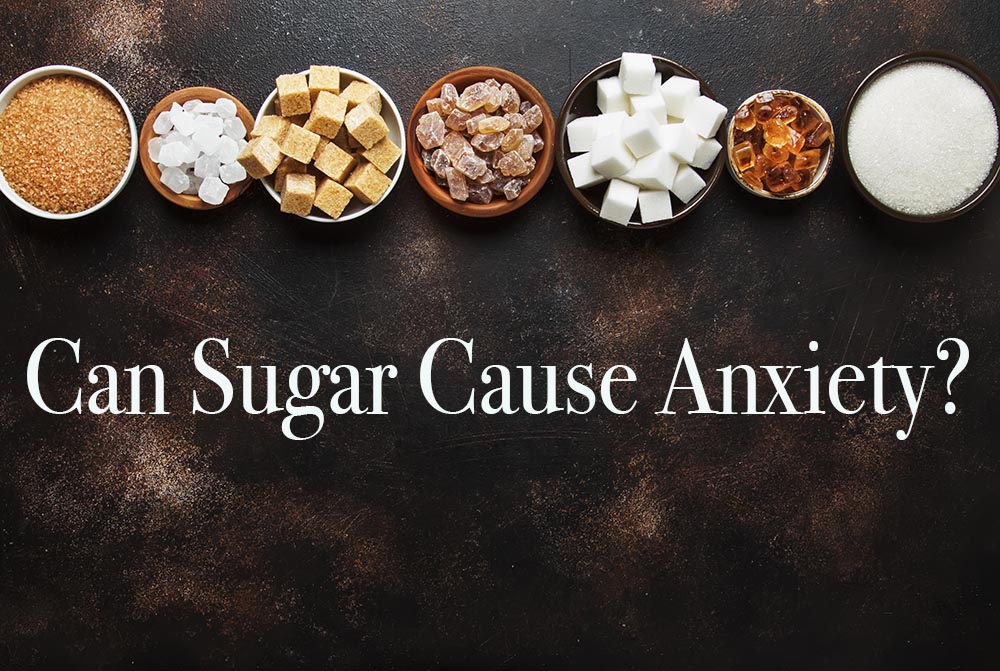
2. Stop Sugar
It’s no secret that sugar is terrible for our physical health, but it is also detrimental to our mental health.
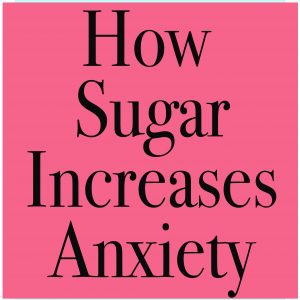
Too often during stressful times, we want to eat our feelings, like a pint of Ben and Jerry’s ice cream. I remember doing that and it never made me feel better. Consuming a large amount of sugar often increases feelings of sadness, anxiety, and irritability.
Sugar causes anxiety because of the rapid rise in insulin that happens after you eat sugar. More insulin means a neurotransmitter imbalance and reduced serotonin, GABA, dopamine, and acetylcholine. A ketogenic diet induces epigenetic changes, which stimulate the energetic output of our mitochondria, reduce the production of damaging free radicals, and favor the production of GABA.
Ketosis reduces the toxic effects of excitatory pathways in our brains which will naturally lower anxiety and panic episodes.When I say sugar, I also mean carbs. A cracker may not taste sweet but once you eat it, the cracker has one fate; it turns into sugar in the blood, causing insulin to rise.
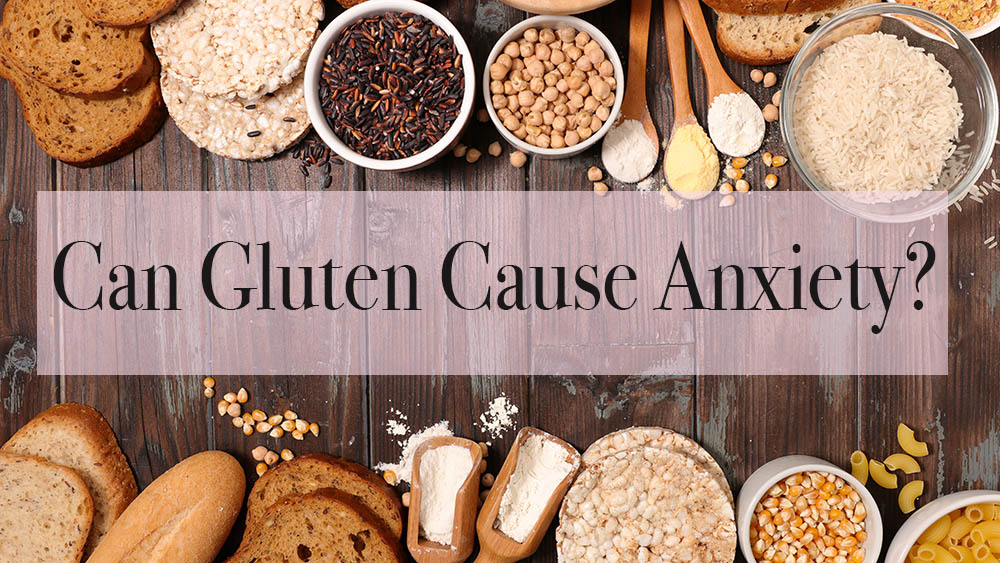
3. Gluten and Anxiety
Patients with depression or anxiety are told they have a chemical imbalance. I have found numerous clients who are suffering from mood disorders to be gluten sensitive. When they eliminate gluten from their life, they become a whole new person. But how could a food cause depression? Let’s take a look.
Gluten is the protein found in wheat, rye, barley, and oats. Have you ever put flour and water together to make your own gooey paste? In Poland, they use this for wallpaper paste. I’m not putting that “gummy” paste in my body: it causes way too much inflammation.
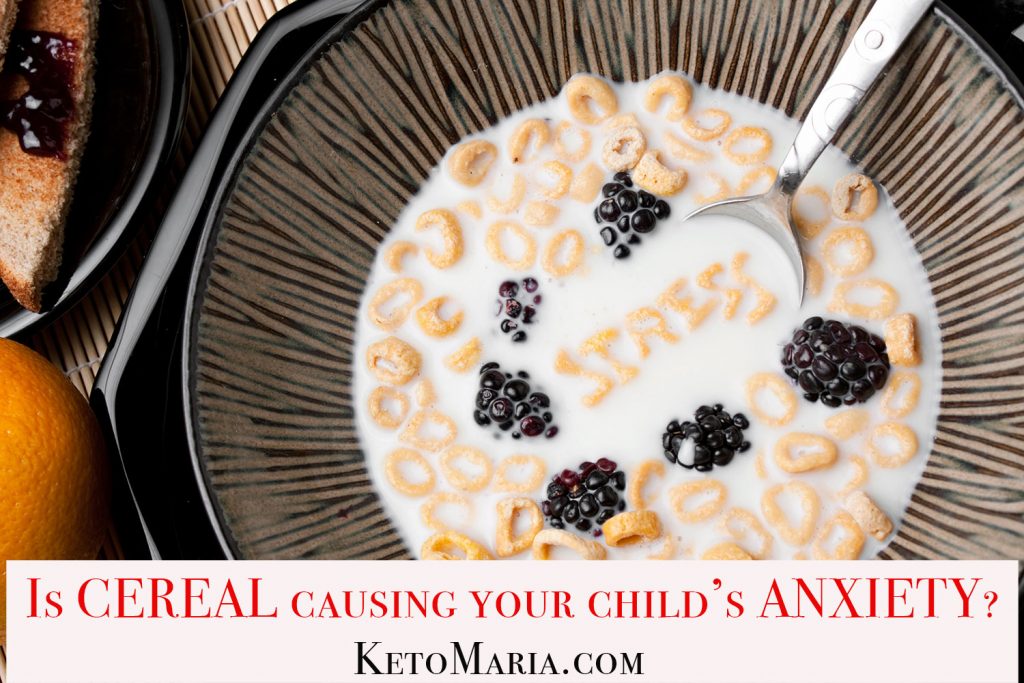
After the digestive tract, the most commonly affected system to be irritated by gluten is the nervous system. It is thought that gluten causes depression in one of two ways. Gluten causes inflammation in the body. A gluten-sensitive individual’s immune system responds to the protein gliadin. Unfortunately, that protein is similar in structure to other proteins present in the body, including those in the brain and nerve cells. A cross reactivity can occur where the immune system “confuses” all proteins in the body for the protein gliadin. This is called cellular mimicry, where the body attacks its own tissues, and inflammation results.
Research shows us that patients with symptoms involving the nervous system suffer from digestive problems only 13% of the time. This is significant because mainstream medicine equates gluten sensitivity almost exclusively with digestive complaints.
Leaky gut is one piece of Celiac and auto immune disorders. Leaky gut is detrimental to our mental health because we need good gut bacteria to produce serotonin and other neurotransmitters. If the gut lining is damaged, you are unable to assimilate all the nutrients, amino acids, probiotics and prebiotics to build healthy brain chemistry.
Maybe you don’t have celiac but you have a gluten sensitivity. A gluten sensitivity can also increase anxiety and depression because of its interference with protein absorption. Specifically, the amino acid tryptophan is essential for brain health. Tryptophan is a protein in the brain responsible for the feelings of well-being and relaxation. A deficiency in this protein can be correlated to feelings of depression and anxiety.
Ninety percent of serotonin production occurs in the digestive tract. So, it makes sense that food effects our mood!
When I tell clients to eat “gluten free” they often grab all the “gluten free” prepackaged foods on the shelf, but that most likely will cause more mood issues and weight gain and will slow the healing process in your gut. Rice flour, the common flour substitute in gluten-free products, is higher in calories, higher in carbohydrates, and lower in nutrients than regular flour. It can cause more inflammation in our body. Gluten Free products increase insulin too much causing the same issue as if you had too much sugar.
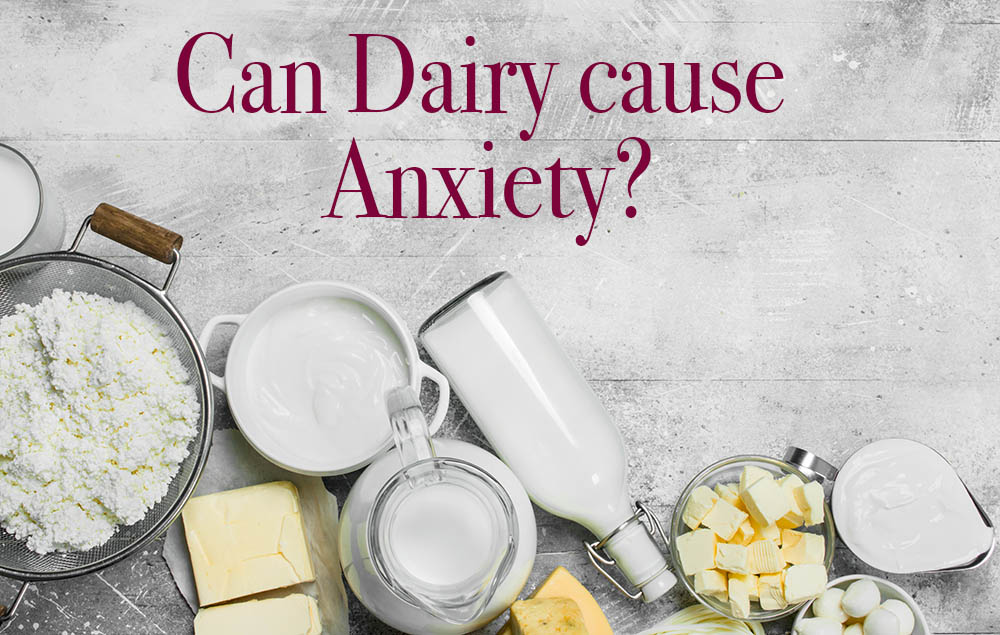
4. Dairy and Anxiety
Many clients of mine have gotten off anxiety medication when we also eliminate dairy. Too often people start a ketogenic diet and eat way too much cheese, butter, cream cheese, not to mention the heavy cream in the coffee (a double wammy for anxiety!)
Many of my clients find they have increased anxiety within minutes of consuming dairy products. Dairy is very inflammatory for many people. It can cause issues with constipation, diarrhea, bloating, as well as causing high histamines. When histamines are high, they block neurotransmitters like serotonin and GABA (the feel good, relaxing brain chemicals).
5. Alcohol and Anxiety
Alcohol increases bad estrogen by 70%. This in turn lowers progesterone. A glass of wine may help you chill at first, but after the buzz, you often find you suffer from not being able to sleep and anxiety increases even more than before the wine.
Alcohol affects every organ of the body, its most dramatic impact is upon the liver. Alcohol metabolism permanently changes liver cell structure. T4 thyroid hormone is activated into T3 in the liver, not in the thyroid. Keeping your liver healthy is essential to our moods. In Chinese medicine, when someone is depressed or anxious, they look to the health of the liver first!
Alcohol also dehydrates us. It may sound simple, but hydrated cells are happy cells!
6. Cut all Aspartame
Aspartame is an artificial sweetener linked to anxiety and depression. It is found in diet sodas, sugar-free gum, FLINSTONE VITAMINS!, light yogurt, light salad dressings and many other foods.
Aspartame has been found to “eat” tiny holes in our cellular membrane. When this happens, things like Multiple Sclerosis (MS), cancer, mood disorders and many other serious issues will show up.
Check out the gross ingredients in Flintstone Vitamins, filled with food dyes, hydrogentated vegetable oils and harmful sweeteners: 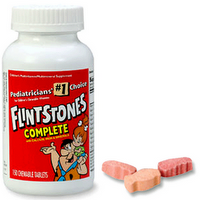
Ingredients: Sorbitol, Dicalcium Phosphate, Magnesium Phosphate, Choline Bitartrate, Sodium Ascorbate, Ferrous Fumarate, Gelatin, Natural & Artificial Flavors (including fruit acids), Pregelatinized Starch, Vitamin E Acetate, Stearic Acid, Carrageenan, Hydrogenated Vegetable Oil (Soybean, Castor), Magnesium Stearate, Zinc Oxide, Niacinamide, FD&C Red #40 Lake, D-Calcium Pantothenate, FD&C Yellow #6 Lake, Aspartame†, Xylitol, FD&C Blue #2 Lake, Cupric Oxide, Pyridoxine Hydrochloride, Sucrose, Riboflavin, Thiamine Mononitrate, Vitamin A Acetate, Beta-Carotene, Monoammonium Glycyrrhizinate, Folic Acid, Potassium Iodide, Biotin, Vitamin D, Magnesium Oxide, Vitamin B12.
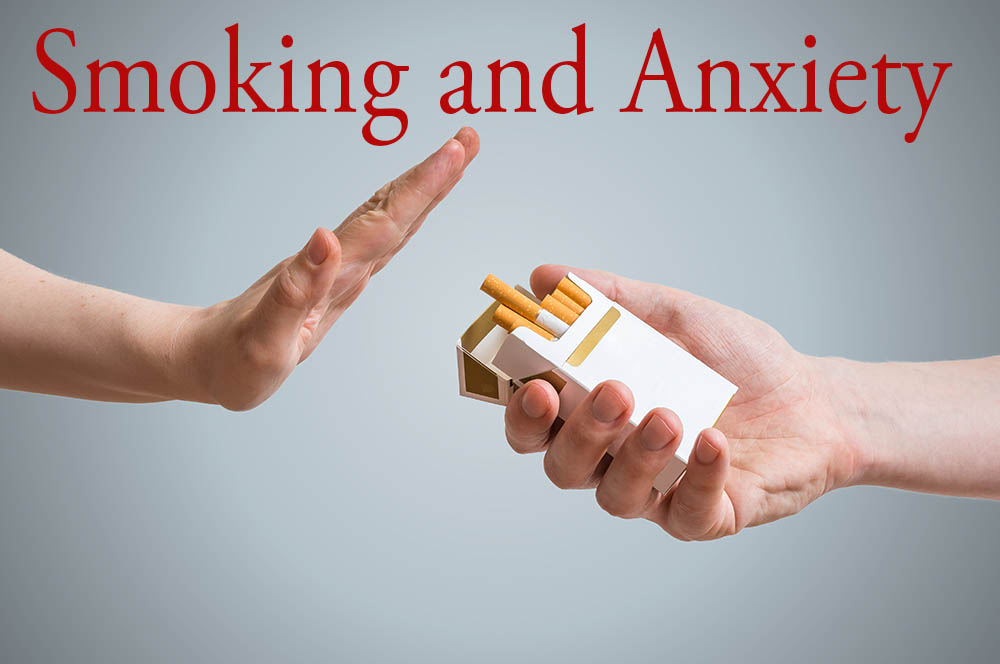
7. Stop Smoking
Smoking damages the mitochondria as well as lowers neurotransmitters like GABA and serotonin, which in turn increases anxiety and depression.
8. Supplements that Cause Anxiety
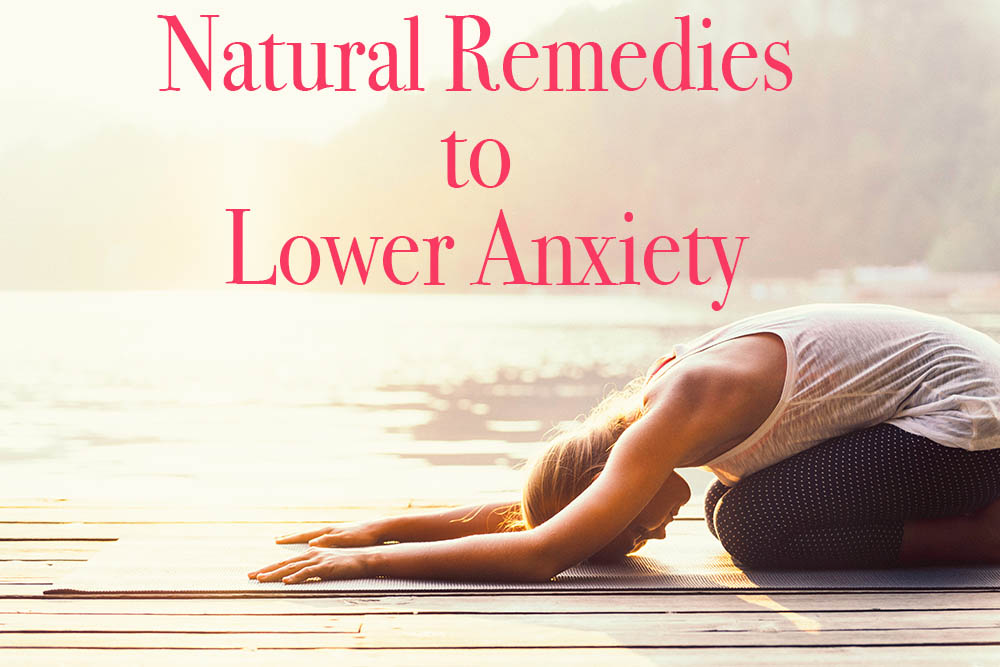
THINGS TO ADD TO LOWER ANXIETY
1. Females, get your progesterone checked.
Low progesterone is the leading cause of anxiety in women.
If you fall asleep easily, but tend to wake up at 3 or 4 a.m. wide awake, the cause is most likely low progesterone. This can happen to women who are menopausal and to those not in menopause. I have seen estrogen dominance in 20-year-olds.
Low progesterone causes anxiety and an inability to sleep. Click HERE to find natural supplements to help with low progesterone.
2. Add Magnesium Glycinate
Most people are very deficient in magnesium because we once got magnesium from our water supply. The soil is now depleted of minerals and most people are drinking filtered or bottled water devoid on minerals. The next best source of magnesium is Halibut; a pricy and hard to get fish!
Do not waste money on cheap magnesium such as magnesium oxide or magnesium citrate. They are not absorbable.
Click HERE to find the magnesium my whole family takes.
3. Consider CBD oil
CBD oil is wonderful for lowering anxiety and helping with sleep! We also love CBD oil for helping with Craig’s chronic Lyme pain.
How does CBD oil help with anxiety? Serotonin is a neurotransmitter that plays an important role in your mental health. Low serotonin levels often cause depression and in many causes cause anxiety. CBD has been found to interact with CB1 and CB2 receptors which are mainly found in the central nervous system and the peripheral nervous system. CBD oil helps serotonin signals and in return, it often helps lower anxiety.
I personally love the Hemp Oil 600.
4. Add in Folate
A folate deficiency is a known cause of anxiety. Start your day with eggs rather than cereal. Eggs contain a lot of folate. One egg contains 22 mcg of folate.
Even better would be to add in liver! A 3-ounce serving of beef liver packs 212 mcg of folate! If you don’t like organ meat, you can take a supplement like I do. Ancestral Supplements have organic organ supplements. Click HERE to find. (use code MARIATEN for 10% off)
5. Consider other natural supplements
There are many natural supplements that help lower anxiety. I have a whole chapter on supplements in my book Secrets to Controlling Your Weight Cravings and Mood.
Amino acids such as GABA and l-theanine are very calming and I often have clients take them before a speech. L-theanine is more effective than GABA supplements in crossing the blood-brain barrier but both are very helpful.
Click HERE to find l-theanine.
Click HERE to find full anxiety supplement plans.

6. Get outside
Nature helps calm me down!
Reduced melatonin from lack of sunlight disturbs the sleep cycle and cause seasonal depression as well as feeling of anxiety.
Whenever I feel anxious, I go outside for a run! Even in the middle of winter!

7. Prioritize sleep
Do you think that getting away with only five, six, or seven hours of sleep is just fine?
Sleep is our bodies’ way of recharging our hormones, cells, and neurotransmitters for the next round of daily stressors. It is the period in which we lower the energy and stress levels expelled each day, we balance out thyroid hormone, our muscles and soft tissues repair and revitalize, and our mind is able to process memories and things we have learned for the day.
Having one day of sleep deprivation is not fatal, but it will cause a decrease in emotional, physical, and overall function. Overtime, these negative changes become bigger concerns such as weight gain, thyroid disorders, high blood pressure, and a decrease in the immune system.Quality sleep will help with balancing your brain, hormones, and cravings and will get you back to your happy, natural rhythm.
Sleep deprivation impairs our ability to metabolize carbohydrates and it increases our stress hormones. This can lead to high blood sugar, high insulin levels, unbalanced neurotransmitters, and weight gain. If you are staying awake to get more things done, to surf the Internet, or to watch TV, you are not alone. Our society seems to reward people for working more and sleeping less. The pharmaceutical industry encourages this dysfunctional sleep pattern by offering drugs that help you fall asleep and drugs that help you wake up.
8. Try essential oils
Aromatherapy is when you inhale the scent of essential oils to improve your well-being. Essential oils are aromatic liquids that come from flowers, plants and fruits.
One theory is when you stimulate the smell receptors in your nose, it sends messages to your nervous system.
The U.S. Food and Drug Administration (FDA) doesn’t regulate essential oils, so be careful and I suggest to only use therapeutic-grade oils that don’t contain synthetic fragrance. Click HERE to find the oils we use.
We have multiple diffusers (click HERE) in our home. Instead of using toxic fragrant sprays like Glade aerosol which can increase estrogen dominance, we have diffusers in our bathrooms with pleasant fragrances. We also have diffusers in the bedrooms that have essential oils for relaxation and anxiety relief. For diffusers, place 20 drops of your favorite essential oil into the diffuser and add water to the water line marked in the diffuser. Turn it on and enjoy!
You can also use essential oils on your skin; however, they must be diluted with a carrier oil such as almond oil or jojoba oil before they’re applied to the skin. This decreases your possibility of irritation. For adults, every 15 drops of essential oil should be diluted with 1 ounce of carrier oil. For children, the mixture is much more diluted with a ratio is 6 drops of essential oil to 1 ounce of carrier oil and they should be monitored by an adult.
My favorite scents for lowering anxiety are:
- Lavender: Lavender is one of the most popular aromatherapy oils and is thought to calm anxiety by impacting the limbic system, the part of the brain that controls emotions.
- Jasmine: Jasmine oil has a gorgeous floral scent. Inhaling jasmine oil can promote a sense of well-being and romance. Jasmine oil is thought to be calming for the nervous system without causing drowsiness.
- Bergamot: Bergamot oil comes from bergamot oranges and has an invigorating citrus scent. I love this smell and it has been thought to helps relieve anxiety and improve mood. Be careful using this scent in the sun, it can promote burning.
- Ylang ylang: Ylang ylang is used in aromatherapy to promote relaxation.
According to a 2006 study, inhaling a blend of ylang ylang, lavender, and bergamot decreased heart rate, anxiety levels, blood pressure, and serum cortisol.
9. Move your body!
10. Add Probiotics
Probiotics are helpful micro-organisms that live in our intestinal tract. In a healthy body, good bacteria make up most of the intestines’ micro-flora and protect digestive health. If you primarily have good bacteria, your immune system will function optimally and will help you extract essential nutrients in the foods you eat.
Our moods are directly correlated to the intestinal flora of our gut. The nervous system actually begins in the gut and travels to the brain; in the past, it was believed the nervous system ran the other way. This is why what we put in our stomach is so essential to our mental health. Having healthy intestinal flora ,which you can achieve with probiotics, increases our moods and decreases our cravings.
A probiotic supplement helps increase serotonin. Click HERE to find the one I take daily (my kids also take THIS one). 70% of our immune system is in our gut. This is the best thing for anyone who is depressed or dealing with cravings should take.
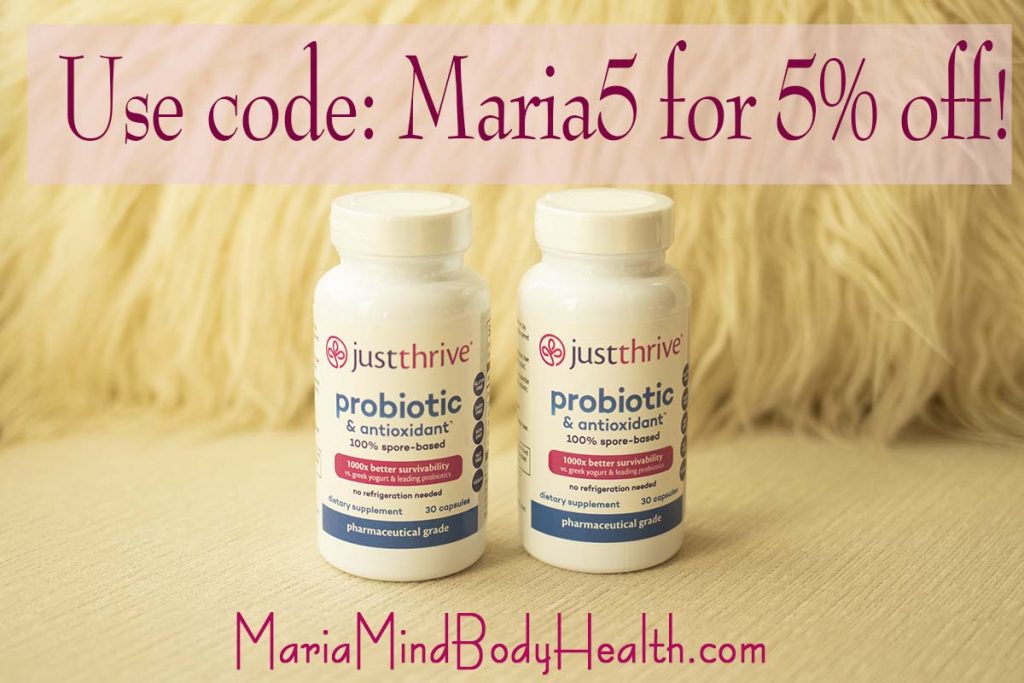
11. Meditate
We are living in a time of chaos with Covid 19. Often times such chaos burdens your mind. It’s like a demanding person, jealous of your peace. Chaos does everything in its power to draw you in and keep your anxiety level high. However, with meditation, you can use the quietness in your mind to surround you and calm the chaos around you.

12. Take time for GRATITUDE
I love this quote about gratitude because it is a reminder that life is like waves of the ocean; there are ups and there are downs. I have this framed and hung by our door as a reminder.
When we were in the process of adopting children, my husband, Craig, lost his job which caused us to put our adoption on hold; we also lost our house and sold our cars. This was a terrible time of sadness for us. There were many times I didn’t want to get out of bed.
A friend told me to start writing a cookbook to help raise money for our adoption so I did! It gave me a reason to wake up.
I also started teaching yoga at Anderson Window corporate office over the lunch hour and my friend let me use her dance studio to teach yoga classes when she wasn’t using it for dance so I could help make extra money. Craig came to every class.
I wasn’t about to lie down and let this devastation get the best of me. I read this quote at the end of every yoga class for my students.
The other day, I was sent a photo on Facebook from an old yoga student of mine. It was of an eye pillow I made to sell for extra money. That reminded me of just how hard those times were. I even made healthy dog treats and mittens out of old sweaters to sell. The library was our “date night”… we would pick out movies and books for entertainment since we no longer could afford to eat out.
All of this led us down the path to working harder and not eating out at restaurants was not just more affordable, it was much healthier anyway! These struggles helped me be gracious for the gifts I have been given.
I want to express my gratitude to you, the reader!
My goal for my blog is for you to do something every day… even if it is something small… to honor your body.
Many blessings to all of you! You all helped me through the most difficult time in my life and I am eternally grateful!
ANXIETY TESTIMONY
Most people I consult are doing keto totally wrong. Get fast results with the my NEW Keto Packages!
Click HERE to check out my NEW Keto Packages!
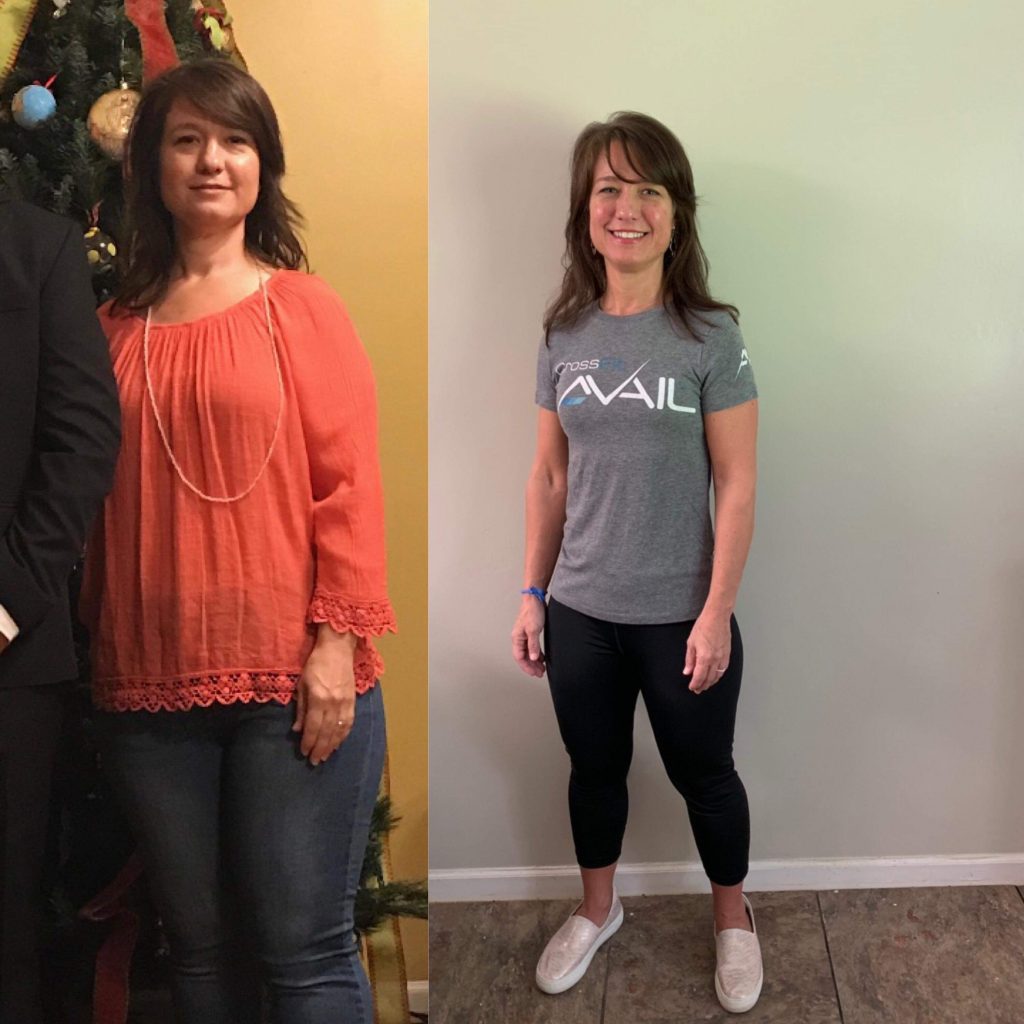



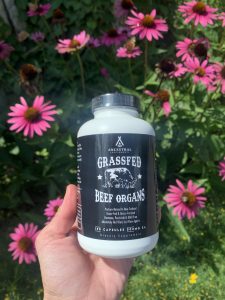

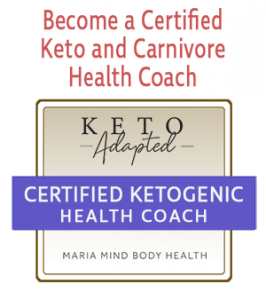

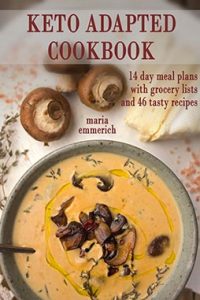

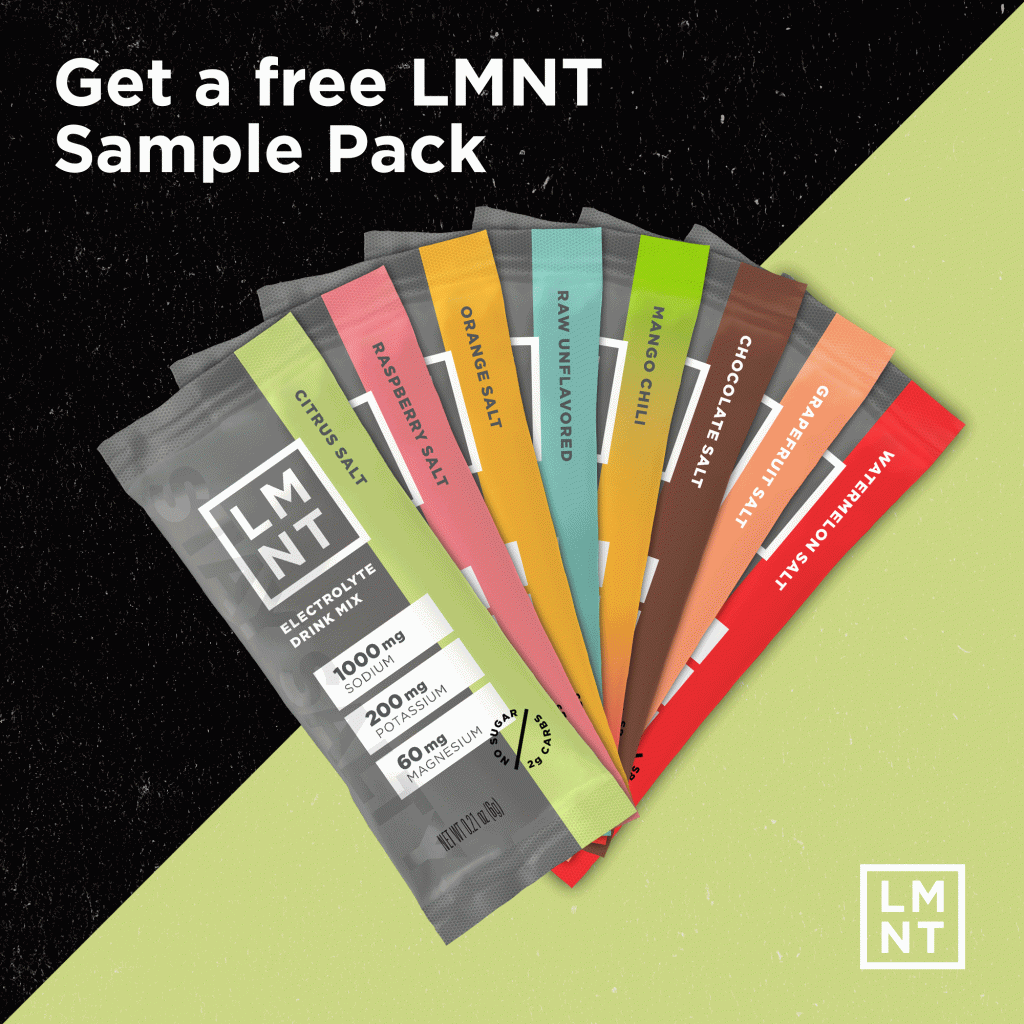



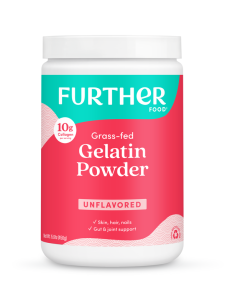

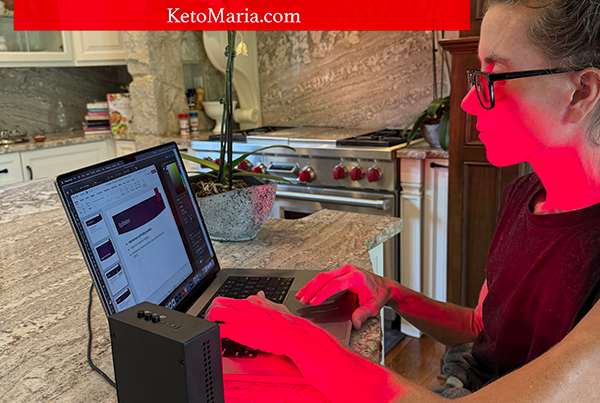

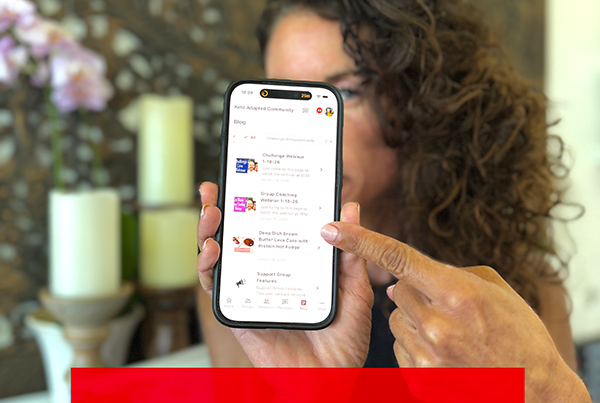
I’m surprised there are no comments on this post! I work in a mental health office and am amazed by the number of drugs people are on & how dependent they are! Children too! 🙁 I’ve believed for a long time there must be other solutions, starting with diet, and all the other things you mention, Maria. Thanks for such a timely article.
Thank you!
My son is on natural supplements for his anxiety and I was impressed to see that you’ve recommended much of what his naturopath also did. For the liver pills, do you take 6 a day as recommended on the bottle?
Thanks! For an adult, yes 6 a day. 🙂